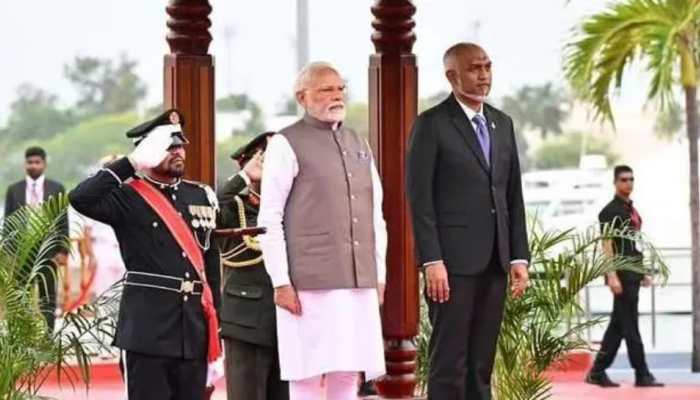What China And Global Media Are Saying About PM Modi’s Visit To Maldives
Maldives President Mohamed Muizzu, who campaigned on an “India Out” slogan, took early steps in office to distance the country from India, including expelling Indian military personnel and strengthening ties with China, moves seen by New Delhi as a shift toward Beijing.
Trending Photos
)
New Delhi: On July 26, 2025, Prime Minister Narendra Modi participated in the 60th Independence Day celebrations of Maldives as the chief guest. His presence at the event grabbed headlines not only in India and Maldives, but across the world.
The visit stood out for several reasons. Maldives’ President Mohamed Muizzu had built his 2023 election campaign around the slogan “India Out”. After coming to power, he had sent strong signals distancing the country from India. He also moved swiftly to forge closer ties with China. His early months in office were marked by a decision to send back Indian military personnel stationed in the Maldives. This was viewed in New Delhi as a potential pivot toward Beijing.
That same leader has now invited the Indian prime minister as guest of honour at the nation’s biggest official event. The symbolism was unmistakable. It marked a moment that was closely tracked in foreign capitals, especially as China continues its attempts to deepen influence across the Indian Ocean region.
Chinese State Media Responds
Beijing’s Global Times, a state-run publication, published a commentary criticising the tone of Indian media coverage surrounding the visit. According to the publication, some Indian platforms had portrayed the trip as a strategic setback for China and a diplomatic win for India.
In its analysis, the Global Times accused Indian media of engaging in zero-sum thinking, suggesting that any gain for India must mean a loss for China. It cited comments from Qian Feng, director at the National Strategy Institute at Tsinghua University, who argued that the Maldives naturally prioritises relations with its neighbours but also pursues a diversified foreign policy, including engagement with China's Belt and Road Initiative. “These approaches are not in conflict,” he said.
Singapore and U.S. Media Weigh In
Singapore-based Channel News Asia headlined its coverage: “India’s Modi reshapes ties with Maldives.” Their report highlighted how Modi’s visit included new infrastructure partnerships, financial commitments and signs of renewed warmth between the two countries.
PM Modi inaugurated a new defense ministry building and Indian-funded projects and announced economic support.
According to Channel News Asia, the visit was viewed in New Delhi as reassurance that Maldives would not drift too far into China’s orbit. The channel highlighted how Muizzu’s early months had raised concerns after he ordered the withdrawal of Indian military personnel.
The Washington Post echoed this view. In a detailed report, the paper called the two-day trip “strategically vital” and said it pointed to India’s broader goals of asserting presence across key sea routes in the Indian Ocean. It highlighted the announcement of a $565 million line of credit from India to fund development projects. The publication said the visit may mark the beginning of a shift toward restoring normalcy in bilateral ties.
A Look From the UK
British daily The Independent took a broader view, framing the visit in the context of recent diplomatic turbulence. The publication emphasised that tensions had risen after the Indian government promoted Lakshadweep as a tourism hub, which some in the Maldives perceived as an attempt to redirect Indian tourists away from their beaches. Celebrities in India had even called for a boycott of Maldives as a travel destination.
The report added that President Muizzu chose to visit China before making a trip to India, something that had not gone unnoticed in New Delhi. Muizzu’s post-China announcement about reducing dependency on India for essentials like medicines and food also drew concern.
But things began to improve when Muizzu attended Modi’s swearing-in ceremony earlier this year. That visit set the stage for a gradual warming of ties, culminating in the current trip.
A New Phase for India-Maldives Relations
Pakistan’s Express Tribune said Modi’s visit ended on a note of clarity and mutual affirmation. It quoted President Muizzu calling the trip “a defining moment” in relations between the two nations. In social media posts shared at the conclusion of the visit, Muizzu acknowledged the importance of people-to-people ties and long-term cooperation across sectors. In a reciprocal message, PM Modi said India would stand by the people of Maldives in their aspirations.
Germany’s Deutsche Welle (DW) provided a strategic lens on the visit. It emphasised Maldives’ critical location along shipping lanes in the Indian Ocean. Despite its image as a tourist haven, the report described Maldives as a “geopolitical hotspot” nestled across 1,192 islands.
DW pointed out how this geography has made it a focal point in the growing rivalry between India and China. Their report argued that the region is becoming less about leisure and more about maritime strategy and political influence.
What Experts Are Saying
According to a commentary by Aditya Shivamurti, associate fellow at Observer Research Foundation (ORF), Maldives’ policy initially leaned strongly toward China. He explained how “India Out” had dominated discourse in 2023, and India’s presence was sharply reduced.
But by 2024, Shivamurti observed a shift. The domestic economic situation in Maldives worsened. Parliamentary dynamics changed. Chinese promises failed to meet expectations. These developments pushed Muizzu to reassess foreign policy.
The analysis added that India responded with pragmatism. It avoided escalation and focused instead on diplomatic engagement and support. In return, the Maldives leadership began acknowledging India’s critical role in areas like health, development and infrastructure.
ORF’s report concluded that both countries are now trying to separate foreign policy from domestic politics. While the Maldivian Democratic Party has historically been seen as pro-India and the ruling PNC as leaning toward China, Muizzu seems to be moderating that binary. He has taken steps to respect India’s sensitivities, and India, in turn, has extended support.
As per Shivamurti’s view, the visit was more than symbolic. It was a recalibration. It offered not just headlines, but signs that pragmatism, diplomacy and shared interests are still possible in a region crowded by rival influences.
Stay informed on all the latest news, real-time breaking news updates, and follow all the important headlines in india news andworld News on Zee News.
Live Tv



)
)
)
)

)
)
)
)
)
)
)
)
)
)
